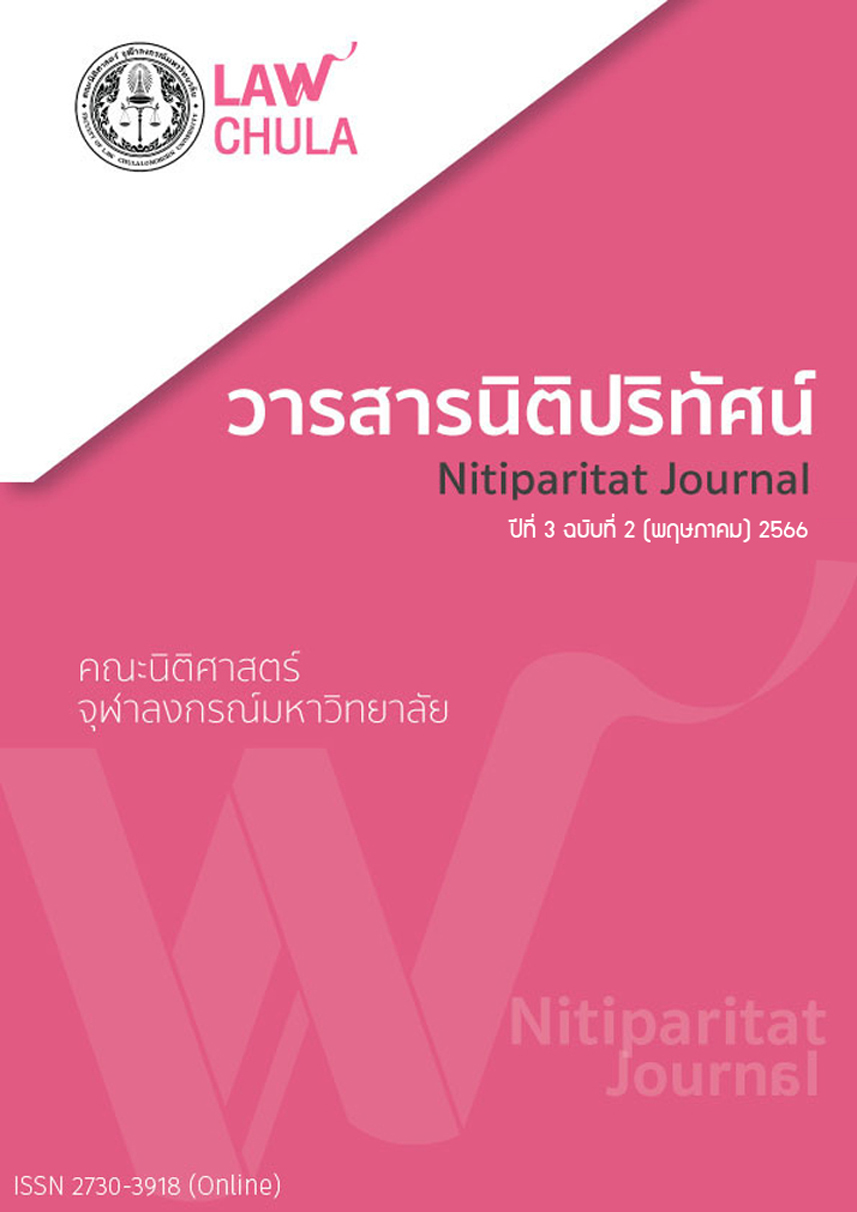โทษประหารชีวิตตามแนวคิดของคานท์ เบนแธม และสำนักกฎหมายธรรมชาติ
คำสำคัญ:
โทษประหารชีวิต, อิมมานูเอล คานท์, เจอรามี เบนแธม, ทฤษฎีจริยศาสตร์เชิงกรณียธรรม, ทฤษฎีอรรถประโยชน์นิยม, สำนักกฎหมายธรรมชาติบทคัดย่อ
วิวาทะที่ว่า ‘โทษประหารชีวิตควรมีการบังคับใช้ต่อไปหรือไม่’ ยังคงเป็นคำถามที่บุคคลในสังคมไทยรวมถึงสังคมโลกต่างโต้เถียงกัน บทความทางวิชาการนี้จึงจัดทำขึ้นเพื่อศึกษาในสองประเด็น ประเด็นที่หนึ่งโทษประหารชีวิตควรมีการบังคับใช้ต่อไปหรือไม่โดยจะวิเคราะห์กับแนวคิดของอิมมานูเอล คานท์ (Immanuel Kant) โดยพิจารณาจากทฤษฎีจริยศาสตร์เชิงกรณียธรรม (Deontological Ethics หรือ Deontology) และวิเคราะห์กับแนวคิดของเจอรามี เบนแธม (Jeremy Bentham) โดยพิจารณาจากทฤษฎีอรรถประโยชน์นิยม (Utilitarianism)
ในประเด็นที่สองหากควรมีการบังคับใช้ต่อไปต้องอยู่ภายใต้แนวทางการควบคุมอย่างไร โดยแบ่งการวิเคราะห์ออกเป็นสองแนวทาง ได้แก่ แนวทางที่หนึ่ง หลักความได้สัดส่วนตามแนวคิดของคานท์และเบนแธม และแนวทางที่สอง หลักสันนิษฐานไว้ก่อนว่าเป็นผู้บริสุทธิ์ตามแนวคิดของสำนักกฎหมายธรรมชาติ
เอกสารอ้างอิง
ประมวลกฎหมายอาญา มาตรา 19 วรรคหนึ่ง ผู้ใดต้องโทษประหารชีวิต ให้ดำเนินการด้วยวิธีฉีดยาหรือสารพิษให้ตาย
ปราโมทย์ เสริมศีลธรรม, หลักเกณฑ์ในการกำหนดโทษทางอาญา ภายใต้โครงการสนับสนุนสารสนเทศเพื่อการทำงานของสมาชิกรัฐสภา, (กรุงเทพฯ : สถาบันพระปกเกล้า, 2564), หน้า 14.
Herbert Morris, “The Right of Punishing and Pardoning” in Freedom and Responsibility, (California: Stanford University Press, 1961), p. 503.
Gertrude Ezorsky, “Jusctice and Punishment” in Philosophical Perspective on Punishment, (Albany: State University of New York Press, 1972), pp. 104-105.
สหธน รัตนไพจิตร, “ความประสงค์ของการลงโทษทางอาญา : ศึกษาเฉพาะประเทศไทยสมัยใช้กฎหมายลักษณะอาญาและประมวลกฎหมายอาญา” (วิทยานิพนธ์มหาบัณฑิต คณะนิติศาสตร์ มหาวิทยาลัยธรรมศาสตร์, 2527), หน้า 36-37.
ปราโมทย์ เสริมศีลธรรม, หลักเกณฑ์ในการกำหนดโทษทางอาญา ภายใต้โครงการสนับสนุนสารสนเทศเพื่อการทำงานของสมาชิกรัฐสภา, หน้า 16.
Immanuel Kant, The Metaphysical Elements of Justice, (Newyork: Macmillan, 1985), P. 99-107.
Immanuel Kant, “Division Of The Science Of Right” in Philosophy of Law (Edinburgh: T. & T. Clark, 1887), P. 54.
“Lex Talionis” มีหลักการอยู่ว่า ผู้กระทำความผิดทำให้ผู้เสียหายได้รับความเสียหายเช่นใด ผู้กระทำความผิดก็ต้องถูกลงโทษให้ได้รับความเสียหายเช่นนั้น หรือ “ตาต่อตาฟันต่อฟัน” ซึ่งเป็นลักษณะที่ปรากฏอยู่ในประมวลกฎหมายของพระเจ้าฮัมมูราบี (Hammurabi’s code)
Sherry F. Colb, Narrow Debate About The Death Penalty, Verdict Comments. Available at: https://verdict.justia.com/2020/07/27/narrow-debate-about-the-death-penalty (Accessed: December 21, 2022).
Reiss, H., Kant: Political Writings (Cambridge: Cambridge University Press ed., 1970), P. 43
วรเจตน์ ภาคีรัตน์, ประวัติศาสตร์ความคิดนิติปรัชญา, (กรุงเทพฯ : สำนักพิมพ์อ่านกฎหมาย, 2564), หน้า 374.
Jeremy Bentham, The Theory of Legislation, ed. C. K. Ogden, (London: Kegan Paul, Trench, Trubner & Co., 1931), P. 96
Hugo Adam Bedau, “Bentham's Utilitarian Critique of the Death Penalty,” Journal of Criminal Law and Criminology 74 (1983): 1055-1060,
พระราชบัญญัติยาเสพติดให้โทษ พ.ศ. 2522 มาตรา 65 ผู้ใดผลิต นำเข้า หรือส่งออกซึ่งยาเสพติดให้โทษในประเภท 1 อันเป็นการฝ่าฝืนมาตรา 15 ต้องระวางโทษจำคุกตลอดชีวิตและปรับตั้งแต่หนึ่งล้านบาทถึงห้าล้านบาท ถ้าการกระทำความผิดตามวรรคหนึ่งเป็นการกระทำเพื่อจำหน่าย ต้องระวางโทษประหารชีวิต
ประมวลกฎหมายยาเสพติด มาตรา 145 ผู้ใดผลิต นำเข้า ส่งออก จำหน่าย หรือมีไว้ในครอบครองซึ่งยาเสพติดให้โทษในประเภท 1 อันเป็นการฝ่าฝืนมาตรา 90 ต้องระวางโทษจำคุกไม่เกินสิบห้าปี และปรับไม่เกินหนึ่งล้านห้าแสนบาท ถ้าการกระทำความผิดตามวรรคหนึ่งเป็นการกระทำดังต่อไปนี้ (1) การกระทำเพื่อการค้า ต้องระวางโทษจำคุกตั้งแต่สองปีถึงยี่สิบปี และปรับตั้งแต่สองแสนบาทถึงสองล้านบาท
ประมวลกฎหมายอาญา มาตรา 201 ผู้ใดเป็นเจ้าพนักงานในตำแหน่งตุลาการ พนักงานอัยการ ผู้ว่าคดี หรือพนักงานสอบสวน เรียก รับ หรือยอมจะรับทรัพย์สินหรือประโยชน์อื่นใดสำหรับตนเองหรือผู้อื่นโดยมิชอบเพื่อกระทำการหรือไม่กระทำการอย่างใดในตำแหน่ง ไม่ว่าการนั้นจะชอบหรือมิชอบด้วยหน้าที่ ต้องระวางโทษจำคุกตั้งแต่ห้าปีถึงยี่สิบปี หรือจำคุกตลอดชีวิตและปรับตั้งแต่หนึ่งแสนบาทถึงสี่แสนบาท หรือประหารชีวิต
ประมวลกฎหมายอาญา มาตรา 202 ผู้ใดเป็นเจ้าพนักงานในตำแหน่งตุลาการ พนักงานอัยการ ผู้ว่าคดี หรือพนักงานสอบสวน กระทำการหรือไม่กระทำการอย่างใด ๆ ในตำแหน่ง โดยเห็นแก่ทรัพย์สินหรือประโยชน์อื่นใด ซึ่งตนได้เรียก รับ หรือยอมจะรับไว้ก่อนที่ตนได้รับแต่งตั้งในตำแหน่งนั้น ต้องระวางโทษจำคุกตั้งแต่ห้าปีถึงยี่สิบปี หรือจำคุกตลอดชีวิต และปรับตั้งแต่หนึ่งแสนบาทถึงสี่แสนบาท หรือประหารชีวิต
UDHR Article 11 Everyone charged with a penal offence has the right to be presumed innocent until proved guilty according to law in a public trial at which he has had all the guarantees necessary for his defence.
ดาวน์โหลด
เผยแพร่แล้ว
รูปแบบการอ้างอิง
ฉบับ
ประเภทบทความ
สัญญาอนุญาต
ลิขสิทธิ์ (c) 2023 กันต์ฤทัย ฤทธิเกษร, นิชาภา ศรีแสนปาง, เบญญารักษ์ บุญนิธี, ปภัสสรา หว่อง, ปิยะวรรธน์ สร้อยสมุทร

อนุญาตภายใต้เงื่อนไข Creative Commons Attribution-NonCommercial-NoDerivatives 4.0 International License.
บทความที่เสนอเพื่อพิจารณาการตีพิมพ์ต้องไม่มีลักษณะคัดลอกผลงานวิชาการและต้องไม่มีเนื้อหาที่ละเมิดลิขสิทธิ์



